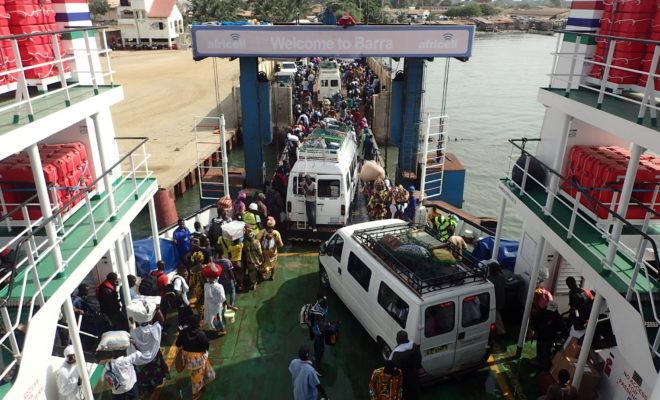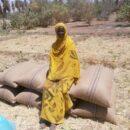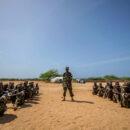Rebuilding after the dictator: New Gambia’s slow road to reform

President Jammeh spent over two decades centralising power and sowing distrust. How do you rebuild a nation after that?

Ferry crossing at Barra. Credit: James Courtright.
How do you dismantle over two decades of repressive and corrupt governance in order to build a fresh democratic system? That’s the challenge currently facing The Gambia.
Since Yahya Jammeh lost the 2016 elections and finally relinquished power under regional pressure in January 2017, the new government of President Adama Barrow has been trying to heal the deep scars left by the former dictator’s 23-year-long dictatorial rule and establish a “new” Gambia.
The administration has a lot to do. Under Jammeh, a series of constitutional amendments made criticism of the government essentially illegal. In the judiciary, the president chased talented officials from the Ministry of Justice and appointed foreign “mercenary judges”. The National Assembly became a rubber stamp parliament that approved anything the president put before it.
At the same time, Jammeh wielded the much-feared National Intelligence Agency (NIA) and paramilitary force known as the Jungulers to sow fear through unlawful killings, torture and arbitrary detention. To protect against possible challenges, he divided the Armed Forces by constantly moving soldiers around and filling the top ranks with loyalists.
“He knew that if the security sector was well organised, it could be a force against him,” says Dr Ismaila Ceesay, a professor of political science at the University of The Gambia. “It was better to divide the security sector to foster mistrust amongst everyone.”
Reform and reconciliation
Since it came to office in January 2017 then, the government of President Barrow has had myriad challenges with which to contend.
On the one hand, the government is trying to forge forwards in building a new order. The National Assembly is working to establish a team to consult the public and draft a new constitution to be put to a referendum. Foreign judges have been replaced with qualified Gambians in the judiciary. And at the justice ministry, staff are being trained up, while additional qualified and experienced lawyers are being sought.
On the other hand, however, the government also needs to grapple with the past before it can go forwards. “We must understand what happened under Jammeh so we never slide back,” says Abubacarr Tambadou, Gambia’s Minister of Justice and Attorney General.
In order to investigate how Jammeh amassed a fortune as president, a Commission of Inquiry was established this July. It has been investigating the financial relations between government ministries, companies and the former president. Its public hearings are being closely followed by the public and its mandate was recently extended by another six months.
The government is also preparing to establish a Truth, Reparations and Reconciliation Commission (TRRC) to shed light on human rights abuses committed under Jammeh. The TRRC is slated to start touring the country early next year to record testimony from victims and perpetrators.
Many are eager for justice as soon as possible, but some have raised concerns over what they see as a rapid time frame for rolling out the commission. Others have pointed out that the TRRC has not yet been allotted funding.
Anna Roccatello, an expert at the International Center for Transitional Justice (ICTJ) warns that truth commissions can be tricky to handle. “They are resource intensive and politically explosive,” she says. “It’s a very complicated process so if they really want to do it they need to be prepared to do a good job because otherwise it can be counter-productive.”
Gambia’s security services
Another key part of the government’s plans to build a new Gambia lies in reforming the security services. As Tambadou puts it, “if the judicial and legal sector was the brains of the old regime, then the hand used to perpetrate the atrocities was the security services”.
As part of this strategy, President Barrow rebranded the NIA as the State Intelligence Services (SIS) within weeks of taking office, while nine former NIA officers are currently on trial.
It is hoped this will lead to new revelations and accountability, but many complain that most perpetrators are still walking free and that little has changed in the agency itself beyond its name. “The structures are still there and the process still remains the same,” says Ceesay. “They are still in the same building where they were torturing people.”
Ceesay and others have suggested that the agency could be disbanded altogether, but Maggie Dwyer, a researcher at the Centre of African Studies at University of Edinburgh, warns against hasty action.
“If you simply fire all of the NIA, it sets a bad precedent,” she says. “If there are no trials then people will say ‘they just fired 500 people and they didn’t prove that those people did anything wrong. Is this really a just system?’”
Dealing with the military
The Gambian Armed Forces (GAF) also requires significant reform from Jammeh’s days. On that front, public relations officer Lamine Sanyang claims the military is embracing change under the new administration. “We are subservient to civilian authority,” he says. “In the previous system, the military was seen as untouchable, but now we’re trying to change that narrative.”
Sait Matty Jaw, director of Gambia Watch, acknowledges this but says trust is still lacking. “They’re being pushed back to the barracks, but they still need a lot of education. Their understanding of security is more about using force. If this remains they cannot build relations with civilians.”
Challenges in reforming the military are exacerbated by frictions within the army. In July, at least five soldiers were detained in relation to allegedly “mutinous” WhatsApp messages. According to Gambian press, at least two of the accused were alleged to be involved in an assassination attempt of high ranking officers. In early October, an additional seven soldiers were discharged without a stated reason. Late last week, 12 soldiers alleged to support Jammeh were charged behind closed doors with a range of unknown offences.
Dwyer says it’s to be expected that some members of the armed forces might still be loyal to Jammeh. “The idea that everyone would suddenly switch allegiance right away is not realistic,” she says. But the problem, she explains, lies in a lack of transparency in how these soldiers were removed.
Some of those who were discharged say it was because they come from the same region as former President Jammeh, a region where he remains popular. Among the former president’s supporters, these discharges have only added to a building narrative of political, and increasingly ethnic, discrimination.
A long road
Transitioning from 23 years of tyranny is a fraught and painful process. Uncovering the truth, righting past wrongs, and rebuilding corrupt institutions are all essential, but can lead to greater instability in the short-term.
Since the start of the year, the government in Banjul has made some missteps and suffered from poor communication. But despite setbacks, observers suggest that it is pursuing the necessary reforms to avoid a return to the dark days of dictatorship, even if progress has been slow.
“It’s clear the new government is genuinely resolved to make a clear and unequivocal break from the dictatorial past,” says Jeffery Smith, director of Vanguard Africa, a pro-democracy outfit that works across the continent. “But the perception is that much of that goodwill has yet to be translated to on-the-ground results.”






